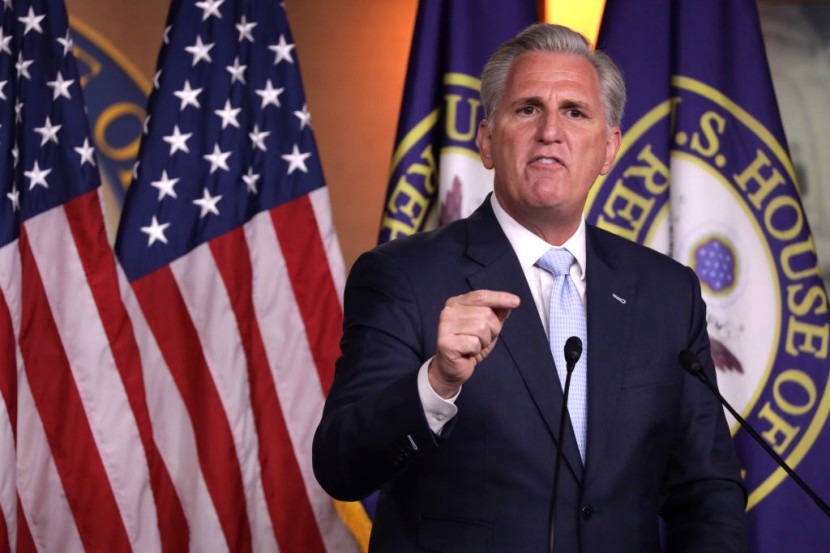
As the deadline for passing spending legislation looms, Republicans in the House of Representatives are navigating a complex landscape of intraparty disagreements and potential government shutdown risks.
Earlier this week, the annual defense appropriations bill faced a setback when House Republicans opposed it due to concerns about overall government spending proposals, as per the Washington Examiner.
House Republicans Navigate Spending Disputes and Shutdown Threat
In response to these challenges, GOP leaders are exploring several alternatives to prevent a government shutdown in the coming weeks. On Tuesday, the House faced a significant hurdle when a vote to begin debate on the annual defense appropriations bill failed.
The bill lacked the support needed to advance, with five Republicans joining all Democrats in voting against it. Simultaneously, staunch conservatives within the Republican Party resist a stopgap spending measure designed to fund the government for 31 days until a final budget agreement is reached.
To address these divisions within the party, Republican lawmakers convened an emergency meeting with the House majority whip's office on Wednesday. The goal was to chart a path forward amid the discord, with several members who oppose the continuing resolution proposal actively engaged in these discussions. Notable figures in these talks include Representatives Ralph Norman (R-SC) and Bob Good (R-VA).
While the progress made during these discussions remains uncertain, House Speaker Kevin McCarthy (R-CA) expressed optimism that there is still ample time to reach a deal. He noted that the crucial date of September 30th, when the government funding deadline arrives, has not yet passed, stating, "The game is not over."
Republicans are currently exploring three potential paths to avoid a government shutdown, though the situation remains dynamic and uncertain, according to a GOP aide.
One option is to vote on a deal proposed by the House Freedom and Main Street caucuses, which would keep the government funded throughout October at a spending level of $1.59 trillion. his spending level aligns with the bipartisan debt ceiling deal signed into law in June. However, more than a dozen House Republicans have opposed this deal, necessitating further negotiations to secure unanimous support within the party.
In response to this challenge, Representative Kevin Hern (R-OK) has suggested introducing an amendment to reduce spending to $1.471 trillion, a figure championed by hard-line conservatives. Appropriators have already marked up this reduced spending level in the spending bills for this year.
Hern's amendment is expected to garner the support of at least three "no" votes, but its success in the House remains uncertain given the slim Republican majority. Simultaneously, centrist Republicans belonging to the Problem Solvers Caucus are scheduled to meet with House Minority Leader Hakeem Jeffries (D-NY) to explore the possibility of a bipartisan deal on government spending.
These discussions have involved ongoing conversations between Republicans and Democrats within the caucus about a temporary funding solution until a comprehensive budget is finalized. Some GOP members suggest that such a deal could include critical provisions related to border security, disaster funding, and other vital measures, according to AOL.
Congress Faces Deadline for Passing Fiscal Year Budget Amid Bipartisan Deal Uncertainty
However, Republicans have emphasized that any bipartisan deal would be temporary, as they remain committed to passing all 12 appropriations bills individually as part of the budgetary process. The clock is ticking, with Congress having until September 30th to pass the budget for the next fiscal year.
This process is further complicated by disagreements between House Republicans and Senate Democrats over top-line spending figures. The schedule for the House's return to vote on the legislation remains to be determined, leaving the fate of government funding hanging in the balance.
Lawmakers have been advised to keep their schedules flexible, with the possibility of weekend sessions looming. During these deliberations, Speaker Kevin McCarthy unveiled a new plan for a stopgap government funding bill.
The proposed project would fund the government for 30 days at a spending level of $1.471 trillion, aligning with the demands of conservative holdouts. This represents a reduction of approximately $130 billion from current government funding levels.
The proposed cut excludes defense spending, the Department of Homeland Security, and Veterans Affairs. Additionally, the plan includes House Republicans' border security bill, minus its eVerify provisions, and commits to establishing a commission to study the national debt crisis.
It also commits the House to capping its 12 appropriations bills at a total of $1.526 trillion. These developments come after the House Republican majority encountered significant challenges this week regarding government funding and the prospect of a shutdown.
Multiple House GOP factions have proposed short-term funding bills, known as continuing resolutions (CRs), to provide lawmakers with additional time to finalize the 12 appropriations bills for fiscal year 2024.
However, some conservative members have expressed reservations about voting for a continuing resolution, citing concerns about extending the priorities of the previous Democratic-controlled Congress.
As the House grapples with these complex issues, the coming days will be critical in determining how to prevent a government shutdown and fund essential government operations. The dynamics of this legislative process will undoubtedly have broader implications for the nation's economic stability and political landscape, Fox News Reported








